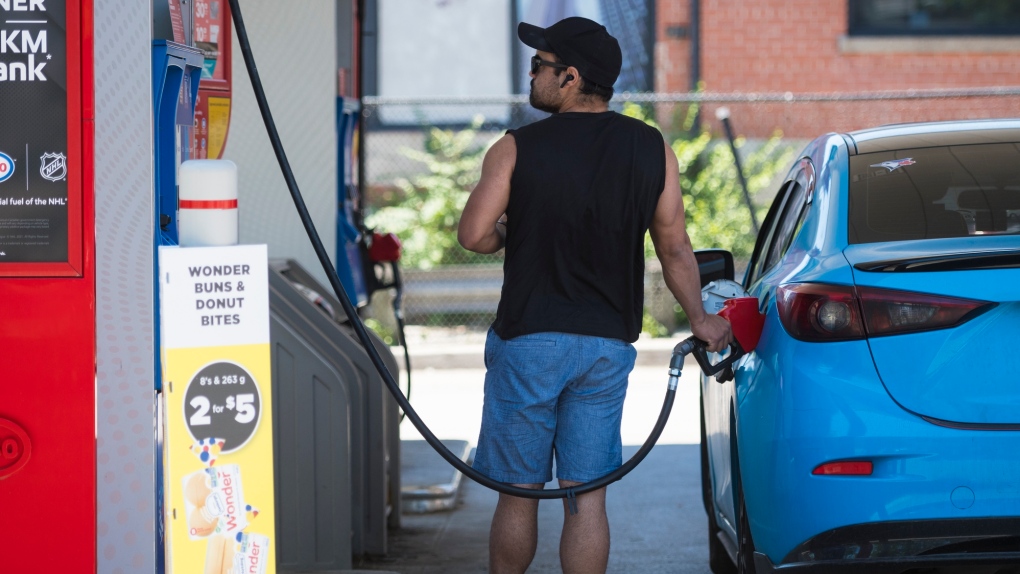Is Canada heading into a recession? This is what you need to know
As gas prices and food costs continue to escalate and another interest rate hike is expected next month, many Canadians are wondering if a recession is coming and how to prepare for a possible economic downturn.
Sixty-eight per cent of Canadians believe the country is heading towards a recession, while 17 per cent believe it has already arrived, according to a new survey from Yahoo Canada/Maru Public Opinion released earlier this week.
However, 15 per cent of Canadians believe the concern about a recession happening now or later is exaggerated.
But if a recession were to occur, what does that mean for Canadians and how should they prepare for it?
WHAT IS A RECESSION?
A recession can simply be defined as a sustained decline in economic activity for at least six months. This could result from a decline in consumer spending, which in turn could cause sales to drop, businesses to cut costs and ultimately more layoffs.
 People shop and wait in long lines to enter stores along Queen Street West during the COVID-19 pandemic in downtown Toronto on Friday, June 11, 2021. THE CANADIAN PRESS/Nathan Denette
People shop and wait in long lines to enter stores along Queen Street West during the COVID-19 pandemic in downtown Toronto on Friday, June 11, 2021. THE CANADIAN PRESS/Nathan Denette
“I think the simple rule of thumb is two straight quarters of economic contraction and production of goods and services,” Derek Burleton, deputy chief economist for TD Bank Group, told CP24.
“So we tend to refer to gross domestic product (GDP) as being that overall measure of activity. If we have two straight quarters of decline that passes the simple litmus test of recession.”
The country’s last recession was in 2020 during the height of the COVID-19 pandemic.
IS THERE A RECESSION COMING?
With inflation at a nearly 40-year high and the Bank of Canada expected to raise its key interest rate next month, these factors could kick start another recession.
Statistics Canada said its consumer price index in May rose 7.7 per cent compared with a year ago, the fastest pace since January 1983.
“It's not an oil price issue or food price issue, it’s widespread inflation across the economy, that tells us and that tells policymakers the economy has just been running too hot for too long. We have an inflation issue rooted in the psychology of Canadians and among businesses, and it's going to have to be dealt with,” BMO Senior Economist Robert Kavcic told CP24.
 A commuter pumps gas into their vehicle at a Esso gas station in Toronto on Tuesday, June 15, 2021. THE CANADIAN PRESS/ Tijana Martin
A commuter pumps gas into their vehicle at a Esso gas station in Toronto on Tuesday, June 15, 2021. THE CANADIAN PRESS/ Tijana Martin
The Bank of Canada has said that Russia's invasion of Ukraine, COVID-19 lockdowns in China and backlogged supply chains are fuelling “uncertainty” and higher prices for energy and food, prompting a need to increase interest rates to control inflation.
The central bank has hiked its key interest rate three times so far this year to bring it to 1.5 per cent.
But many economists, including Burleton and Kavcic, expect the central bank to raise its key rate once again by at least three quarters of a point next month to mirror the U.S. Federal Reserve’s recent interest rate hike.
Burleton said this hike could dampen consumer spending, which in turn could eventually ignite a recession.
“I mean as rates go up, the bigger the chance that economic activity will weaken next year but the Bank of Canada feels from a longer-term perspective if they can bring inflation down to their target that will serve Canadians the best over the medium to longer run. So unfortunately, it's going to come at the cost of some output foregone over the next four to six quarters,” Burleton said.
BMO is not forecasting a recession but Kavcic said if “sticky price pressures” continue and the central bank has to continue raising rates then it will be a “big pill for the economy to swallow.”
“Our view on this is that we're going to see economic growth really stall out through the latter stages of this year and the first half or so of next year.”
TD Bank is also not predicting a recession but said in its quarterly economic forecast that “there is a very thin margin for error if another shock hits economies.”
Burleton noted that Canadians are currently experiencing an unusual recovery after the recession in 2020 and that nothing “is a given at this stage.”
“The economy has shown me real resilience. We saw it with the April retail spending numbers. Our own high-frequency data internally…still shows resilience through May. So the economy is holding up in the first half. I guess the question is, to what extent it softens going forward.”
Burleton added that although risks are rising, he thinks a recession does not seem imminent.
HOW TO PREPARE FOR A RECESSION
In anticipation of a possible recession, 56 per cent of the respondents from Maru Public Opinion’s survey said they have set stricter priorities and reduced their spending in the past month.
Eighty-six per cent said they spent more on food this month compared to last month, while 82 per cent also said they spent more on gas.
 A woman wearing a mask is seen grocery shopping in this file photo. (Anna Shvets/Pexels)
A woman wearing a mask is seen grocery shopping in this file photo. (Anna Shvets/Pexels)
Burleton said it’s a smart move to put away additional savings in preparation of a potential recession.
“It's probably not a bad thing to kind of start thinking about ways to protect yourself as a household in the event (of a recession). I think the good news is that based on aggregate data of the Canadian economy, a lot of households are holding on to additional deposits and savings…and we're counting on some of that cushion to help defend against deeper outcomes in the economy going forward.”
Sixty-three per cent of survey respondents said food is the biggest expense that they have cut down on in the past month, followed by entertainment and clothing and footwear.
The Yahoo Canada/Maru Public Opinion survey was conducted between June 17 and 19 among a random selection of 1,515 Canadian adults who are Maru Voice Canada panelists. The survey has an estimated margin of error of +/- 2.5 per cent, 19 times out of 20.
With files from The Canadian Press
CTVNews.ca Top Stories

'One of the single most terrifying things ever': Ontario couple among passengers on sinking tour boat in Dominican Republic
A Toronto couple are speaking out about their 'extremely dangerous' experience on board a sinking tour boat in the Dominican Republic last week.
Half of Canadians have negative opinion of latest Liberal budget: poll
A new poll suggests the Liberals have not won over voters with their latest budget, though there is broad support for their plan to build millions of homes.
opinion Why you should protect your investments by naming a trusted contact person
Appointing a trusted person to help with financial obligations can give you peace of mind. In his personal finance column for CTVNews.ca, Christopher Liew outlines the key benefits of naming a confidant to take over your financial responsibilities, if the need ever arises.
Teacher shortages see some Ontario high school students awarded perfect grades on midterm exams
Students at a high school in York Region have been awarded perfect marks on their midterm exams in three subjects – not because of their academic performances however, but because they had no teacher.
'My stomach dropped': Winnipeg man speaks out after being criminally harassed following single online date
A Winnipeg man said a single date gone wrong led to years of criminal harassment, false arrests, stress and depression.
Doctors combine a pig kidney transplant and a heart device in a bid to extend woman's life
Doctors have transplanted a pig kidney into a New Jersey woman who was near death, part of a dramatic pair of surgeries that also stabilized her failing heart.
Photographer alleges he was forced to watch Megan Thee Stallion have sex and was unfairly fired
A photographer who worked for Megan Thee Stallion said in a lawsuit filed Tuesday that he was forced to watch her have sex, was unfairly fired soon after and was abused as her employee.
Ottawa injects another $36M into vaccine injury compensation fund
The federal government has added $36.4 million to a program designed to support people who have been seriously injured or killed by vaccines since the end of 2020.
An Ontario senior thought he called Geek Squad for help with his printer. Instead, he got scammed out of $25,000
An Ontario senior’s attempt to get technical help online led him into a spoofing scam where he lost $25,000. Now, he’s sharing his story to warn others.




























